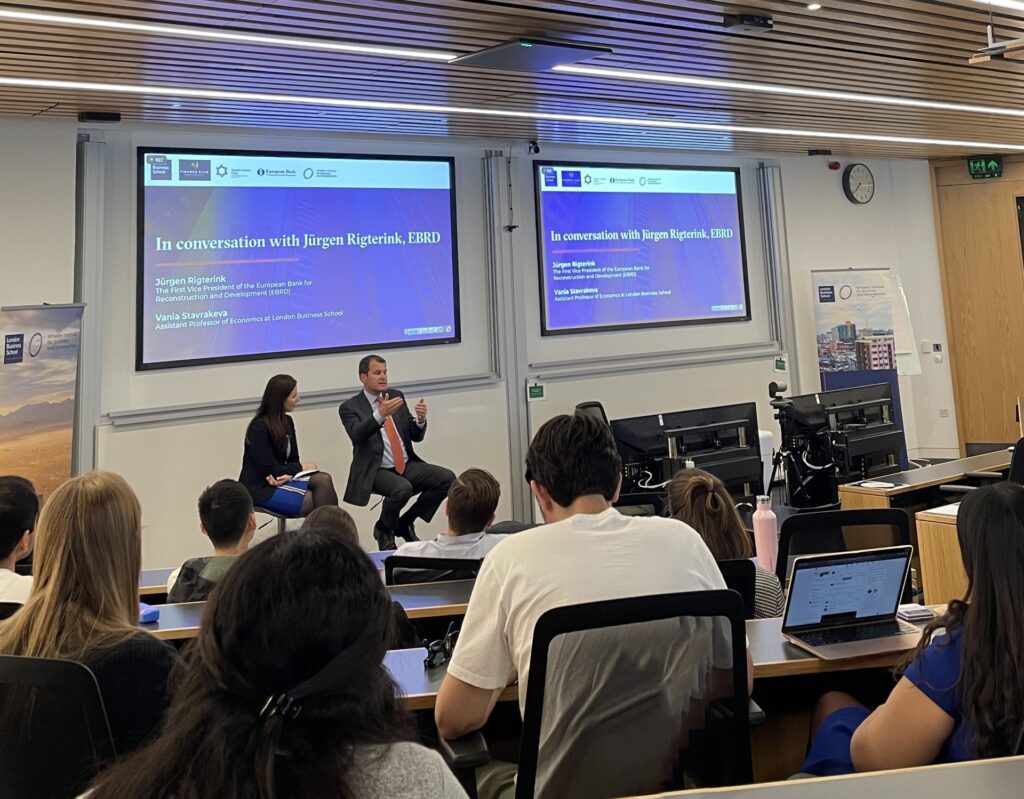The Wheeler Institute is inspired by the purpose and passion of our students, who are focused on applying innovative thinking in the area of business for development. We seek collaborations with student clubs that aim to reshape the way we think about business. The initiatives that we support allow students to apply their business skills and knowledge in complex real-world environments, whilst creating a positive and sustainable impact for local organisations and communities.
On 24 May 2023, the Wheeler Institute for Business and Development in association with London Business School’s Social Impact Club and Finance Club hosted Jürgen Rigertink for a fireside chat. Jürgen offered thought-provoking insights on how the European Bank for Reconstruction and Development (EBRD) is distinct in its investment strategy and, as a result, its investment portfolio. The session was hosted by Elias Papaioannou, Professor of Economics at London Business School and Co-Academic Director of the Wheeler Institute, and moderated by Vania Stavrakeva, Assistant Professor of Economics at London Business School.
The session commenced with a video that focused on EBRD’s impact on emerging economies in the last year. Some highlights include:
- The Bank invested up to €6.4 billion in the Green economy across its regions, including the financing of 200MW solar capacity in central Uzbekistan to power over 250,000 homes.
- One of the Bank’s 254 Inclusion projects last year was the training of 15 female bus drivers in Bakuriani, Georgia. Since the war started, the EBRD deployed over €1.7 billion to support Ukraine. Recently, the Bank financed a grain hub with a capacity of over 200,000 tonnes at the Slovenia-Ukraine border. The Bank enabled 851 businesses to go digital. One of the highlights of last year is the digitalisation of the Suez Canal Economic Zone.

Vania began the discussion by exploring the purpose of the EBRD to better understand why it differs from other global financial institutions such as the World Bank. Jürgen began by explaining the history of how the bank came to be – established following the fall of the Iron Curtain, the EBRD is the only bank in the world that promotes democracy. While it is similar to other banks such as the International Finance Corporation and the African Development Bank the EBRD is unique because of the policy dialogue it engages in alongside its investment as well as its private sector mandate. On the policy front – in Egypt, for instance, the EBRD supported the government to introduce regulatory controls in the space of renewable energy auctions. This successfully led to Egypt’s development of the largest solar park in Africa. On the EBRD’s razor focus on the private sector, the Bank targets 75% of its investment portfolio annually. The EBRD invests at market rates and is firmly market-oriented, with a firm focus on crowding in the private sector, not crowding out. Finally, the EBRD has an AAA rating from Fitch and Moody’s, and this stability enables a thriving business model and a healthy risk appetite.
With this in mind, Vania expressed curiosity as to what distinguishes the EBRD from other commercial banks. Jürgen emphasised that the EBRD has a higher-than-average risk appetite since it invests in markets that other banks would typically not. Vania then inquired about the geopolitical challenges that a bank like the EBRD faces given its investment philosophy. To this, Jürgen shared two valuable insights following the Bank’s successful Annual Meeting and Business Forum last month. First, the EBRD has committed to a limited and incremental expansion into sub-Saharan Africa and Iraq. Second, for the first time in its history, the Board of Directors of the EBRD approved a paid-in capital increase. The intentionality behind this lies in the ongoing conflict in Ukraine. Prior to the war, the EBRD was the biggest institutional investor in the country, investing approximately €1 billion annually. An increase in its capital means there is greater leverage to steer investments toward Ukraine.
Moving to the ‘elephant in the room’, Jürgen was then asked to share insights on Russia’s position and placement as an EBRD shareholder. Jürgen revealed that following the Crimean War in 2014, the EBRD halted all new investments in Russia. This was a significant decision for them as at the time, Russia was the largest recipient of the EBRD’s investments, with approximately 33% of total disbursements.
Finally, the discussion turned to the methodology of choosing projects to invest in, given the EBRD’s unique investment philosophy. Jürgen explained simply, stating that after being present in certain nations for over three decades, the EBRD has become the default. While some governments and companies they engage with refer to the EBRD as ‘the tank’ or ‘bureaucratic’, they also see it as a huge seal of approval.
Opening up the floor to questions, there were several hands raised to understand more about Jürgen’s shared insights. The first question related to understanding concurrently (a) an explanation for why investment sentiment in Central and Eastern Europe and Ukraine has declined; and (b) what the EBRD is doing about it given their investment model.
Jurgen explained that given recent geopolitical tensions and the war on Ukraine, international investors have become more reticent to invest in the wider region, however this is beginning to improve. The EBRD invests in capital markets in more developed regions such as the Baltics, where it often acts an anchor investor which in turn leads to the crowding in of other investors, both local and international.
The next question related to the EBRD’s current exposure in Russia, which amounts to €900 million. Jürgen shared that the EBRD’s ‘principles have a cost’ as shortly after the conflict in Ukraine began, 90% of the EBRD’s exposure was marked down in its books which absorbed a loss of approximately €800 million.
The final question ended on a lighter note where Jürgen was asked to share a recent EBRD success story. Greece became an EBRD country of operation following the global financial crisis. The EBRD assisted Greece in weeding out their non-performing loan portfolio and when Greece’s contract term with the EBRD expires in a couple of years, they will graduate out of the Bank as they no longer need its assistance!
About the speakers

Jürgen Rigertink, First Vice President of the European Bank for Reconstruction and Development (EBRD)
Jürgen Rigterink is the EBRD’s First Vice President and the Head of its Client Services Group. Mr Rigterink oversees the Client Services Group which is comprised of the Banking and Policy & Partnerships departments. He has overall responsibility for the implementation of Banking and Policy objectives, ensuring that the EBRD investments, policy engagement and advisory services deliver the maximum transition impact in the countries where the EBRD works. From July to November 2020, Mr Rigterink was also the EBRD’s Acting President, running the Bank in the period between the departure of Sir Suma Chakrabarti and the arrival of Odile Renaud-Basso. Before he came to the EBRD in 2018, Mr Rigterink was the Chief Executive Officer and Chairman of the Management Board of FMO, the Dutch Development Bank. Before his time at FMO, he worked in the private sector at ABN AMRO, where he ran the company’s activities in Kazakhstan and held a number of senior positions including Sector Head of Central and Eastern Europe, Middle East and Africa.

Vania Stavrakeva, Assistant Professor of Economics, London Business School
Vania Stavrakeva has held the role of Assistant Professor of Economics at London Business School since 2013. Her research interests include international finance, macroeconomics, macro-finance and financial sector regulation. She holds a PhD in economics from Harvard University. She has extensively studied exchange rate determination and how monetary policy, macroeconomics news and beliefs impact exchange rate movements. Within these topics, she has examined questions such as: How does monetary policy impact exchange rates and what changed over the Global Recession and why? What is the source of heterogeneity of beliefs and positions in forex derivative markets? What makes a currency a safe haven currency – i.e. it appreciates during bad times?
About the Author
Devanshi Shah (MBA2024) worked for five years in economic and financial consulting in India and the UAE before coming to LBS. She has advised clients across industries including construction, oil and gas, retail, and real estate, on how to value monetary and other damages arising from legal disputes. She is passionate about inclusivity in finance and education, particularly that marginalized populations in developing countries should be a focus in policy decisions.
About the Social Impact Club
The Social Impact Club supports the development of students in becoming socially responsible business leaders by providing educational, experiential, professional, and networking opportunities to the London Business School community. The club focuses on four main areas: impact investing, sustainability, social entrepreneurship, and foundations / non-profit initiatives.
About the Finance Club
The Finance Club, one of the largest professional student clubs at London Business School, has a goal of helping current members transition into the financial industry through tailored events, technical skills training, and networking sessions covering Corporate and Investment Banking, Sales & Trading, among others. The Club is actively engaged in maintaining a dialogue with alums and professionals in finance to aid LBS’ learning and recruitment efforts.
